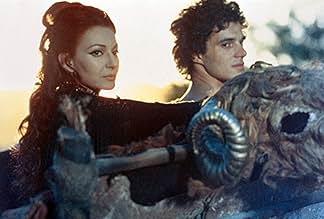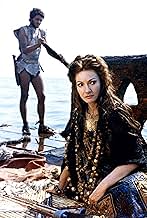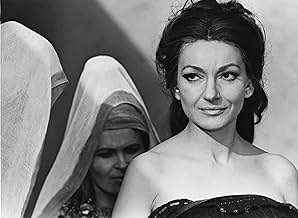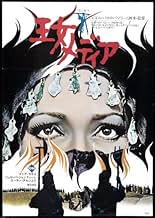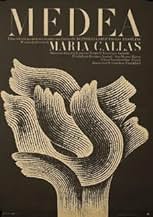Dopo la sua ricerca del leggendario vello d'oro, Giasone torna in Grecia con la potente maga Medea. Tuttavia, quando il re la bandisce, Medea prepara la sua vendetta. Como possono sfuggire a... Leggi tuttoDopo la sua ricerca del leggendario vello d'oro, Giasone torna in Grecia con la potente maga Medea. Tuttavia, quando il re la bandisce, Medea prepara la sua vendetta. Como possono sfuggire alla sua ira?Dopo la sua ricerca del leggendario vello d'oro, Giasone torna in Grecia con la potente maga Medea. Tuttavia, quando il re la bandisce, Medea prepara la sua vendetta. Como possono sfuggire alla sua ira?
- Regia
- Sceneggiatura
- Star
- Premi
- 2 candidature totali
- Glauce
- (as Margareth Clementi)
- Wet-nurse
- (as Anna Maria Chio)
Recensioni in evidenza
"Edipe Re" was framed by a prologue and an epilogue which took place in this day and age."Medea" displays two worlds colliding:Jason's one,a rational world where science begins to surface,and Medea's one,which is that of superstition,magic, a world that is to disappear.The legendary Golden Fleece is nothing but an old rag.And Pasolini does not show the ending of the legend when Medea flies away on her chariot;it's neither a Hollywoodian film ,nor one of those peplums Italian directors used to make by the dozen ten years before.The centaur -played by earnest thespian Laurent Terzieff- ,the only concession to some kind of show,looks like an ordinary character.Some users pointed out the primitive side of the background.But let's not forget that there are two degrees:Medea's world is primitive to the core;Jason's one is attaining what we call civilization.
Well I like weird art & films, I like Pasolini, and I liked Medea in various interesting aspects. I suppose one should at least know the basics of Euripedes story to comprehend the story - Pasolini doesn't focus in the story so much, important facts are assumed by the viewer and the dialogues are scarce within the film. No narration exists.
I think Pasolini here was more interested in presenting the cultural / ethnological / theological / religious stigma of the era - his usual interest on god and religion is also here, despite text is given few opportunities to breed context in this film. We have also the theme of ancient world VS the new world of logic and the new gods. This is one of the films, like, say, Hertzog's films, that are up to the viewer to comprehend, or a film critics would call a symbolic one. Needless to say one has to like to think while watching this one, not be spoon-fed.
Last but not least, the soundtrack enhances this strongly visual experience a lot. A set of strange but intense folk/ethnic/avant guard/experimental songs make the viewing a unique experience for those who like 'hard' films....
When the film opened up and we had the glimpse of a filthy centaur, I was pretty much sold that this film was going to be good, or at least unforgettable. The remainder may not have had as much magic, but it did not disappoint in originality... and cannibalism.
Typically when I think of Italian mythology films, I think of the "sword and sandal" films. This is not one of those. Rather than make the story all romantic and flashy, we get a world that is probably much closer to reality. Assuming that the event told in myth are many, many years BCE, it makes sense to show a much more primitive world than we expect. And in that sense, this film does not disappoint.
This statement by the Centaur in the beginning already covers the entire story. The consequence, the conflict between the archaic and the rationalized, modern world view becomes concrete from this point on, held only by the action of physical powers. Medea's revenge remains completely uncommented and unweighted. What's left is the act alone which Pasolini lifts out of the row of reason and effect.
Medea, accused of its formalistic aestheticism and set in ancient Greece, is actually a pretty modern film, an experiment in ethnologic cinema. It's a colourful, 'sulfurous' work, devout in the immovable silence of a new invented Colchis in the Middle East, heart-breakingly bewitched and shot with the enthusiasm of a hand-camera; with images of purely emotional tension where words are replaced by gestures, communication replaced by the ritual. The pain and the fear for their existence of the characters have priority and that's why this film finds another level of understanding in the viewer, on a merely emotional base - in a swell of emotions which is experienced through Medea's visionary look, where love and death, regret and revenge follow each other without respite.
It is also an opportunity to meet grand Maria Callas on screen. With her natural dignity and those striking features, her penetrative eyes, her harshness, with the real human psychic trauma and angst inside of her she is the authentic, inspiring muse of the film and impersonates perfectly the complexity of Medea: The archaic world of the Greek peasants where indications of a progressing cultural and social stratification is already perceivable.
Lo sapevi?
- QuizFinal part of Pier Paolo Pasolini's "Mythical Cycle" also including Edipo Re (1967), Teorema (1968) and Porcile (1969).
- BlooperWhen Jason speaks to the two centaurs, there is a mismatch in their shadows in the middle of the screen, indicating that the image is a composite.
- Citazioni
King Kresus: You are a barbarian from a foreign land, different from us. We don't want you among us. It is impossible to see into the depths of one's soul.
- ConnessioniEdited into Spisok korabley (2008)
I più visti
- How long is Medea?Powered by Alexa
Dettagli
Botteghino
- Lordo in tutto il mondo
- 689 USD
- Tempo di esecuzione
- 1h 50min(110 min)
- Mix di suoni
- Proporzioni
- 1.85 : 1

